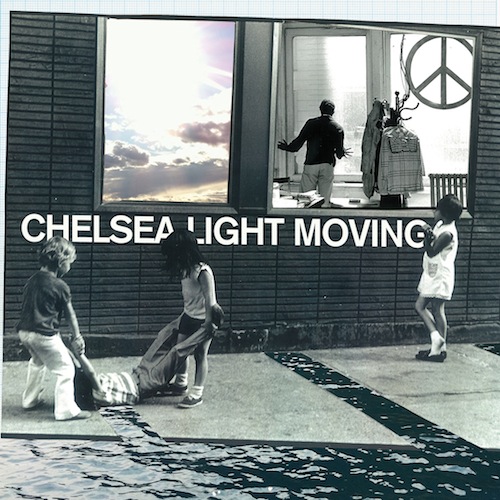Thurston Moore’s discography is nothing if not encyclopedic. The man has worked with and toured with just about every artist you can imagine and has drawn out practically every note and tone that a guitar can possibly make. And his music owes as much to traditionalists like John Fahey and Michael Hurley as it does to experimental artists like Jim O’Rourke and John Cage. On his umpteenth studio album—though his first under the Chelsea Light Moving moniker—Moore joined together with Samara Lubelski, Sunburned Hand of the Man drummer John Moloney, and Keith Wood of Hush Arbors and together they have found a musical mid-point between early 90’s guitar shredders Mudhoney and experimental noise rockers Boris. As drastic as the tightly structured rock detours of Trees Around the Academy and Demolished Thoughts were from his SYR indulgences, the scrawled punk and sludge bite of Chelsea Light Moving can be seen as a welcome addition to an already vast discography. And Moore knows a good thing when he hears it–he brought along many of the same musicians who backed him on his past two records for this one as well, and it shows.
Though in the place of modest, carefully plotted songs, such as those on his recent releases, the tracks on Chelsea Light Moving are thickly poured out, congealing in pools of melodic molasses around the speakers, always on the verge of shorting out whatever power supply is readily available. And as such, the album can be seen as a not-too-thinly-veiled statement of Moore’s recent separation from longtime wife and musical partner Kim Gordon and the ensuing mental chaos inherent of that kind of drastic emotional and physical break. But this isn’t Moore’s “break up” record. He’s far too savvy for that. Chelsea Light Moving, both the album and the band, is more primal scream therapy than New Age healing, and by digging his heels in and antagonistically staring into that unsettling void, he has come away with one of the most engaging albums of his (at the moment) post-Sonic Youth career.
It would be easy to say that the short opening track “Heavenmetal” is a statement of intent on the band’s (read: Moore’s) part, with its repeated refrain of “Be a warrior and love life,” especially with his aforementioned separation from Gordon. And maybe it is, but I’ve come to realize that it’s never wise to take Moore’s music or lyrics at face value, as he always deals in multiple layers of meaning and presentation. That’s not to say that the album is devoid of the dry humor that always seems to skirt around the edges of his music—either with Sonic Youth or without. “Sleeping Where I Fall” finds Moore dragging out his best Black Francis impersonation and having a hell of a time doing it. But the track isn’t simply an attempt at a Moore-fronted Pixies cover band; the song feels wiry and frenetic like the best of Sonic Youth and The Pixies but feels beholden to neither. This is something different—something familiar but very distinct in execution.
The band hits some really eccentric territory on “Alighted,” which alternates between sounding surprisingly thick and viscous—the Boris comparisons are impossible to escape here—and light and unraveling in alternating strokes. But even when putting the music in the perspective of similar artists, Chelsea Light Moving merely seem to use their influences as stepping stones, never as building blocks. And while there may be a few hiccups—the somewhat meandering beat poetry attitude of“Mohawk” and the seemingly throwaway track “Lip” come to mind fairly easily—the record does manage to impress despite being vaguely familiar and prone to flights of guitar fancy for no other reason than it can. But when it’s pulled off with the force and confidence of this group, it’s easy enough to forgive the missteps and overly dramatic guitar theatrics and focus on the highs, and believe me, there are plenty to focus on.
Just listen to the cathartic fuzz rock ending on “Empire of Time” or the curiously elastic mid-90’s bass and guitar throwback of “Groovy & Linda” if you’re still unsure whether Moore has lost either his sense of humor or ability to slather on the distortion while being surrounded by a wall of Marshall stacks. (Hint: he hasn’t.) And while the album may be tinted by listener’s perceptions of his personal life, Moore never forgets to have a good time. If anything, Chelsea Light Moving, again both the record and band, show us that despite how fucked up things can get, you always have friends willing to plug in and help shred the wallpaper from the walls.

